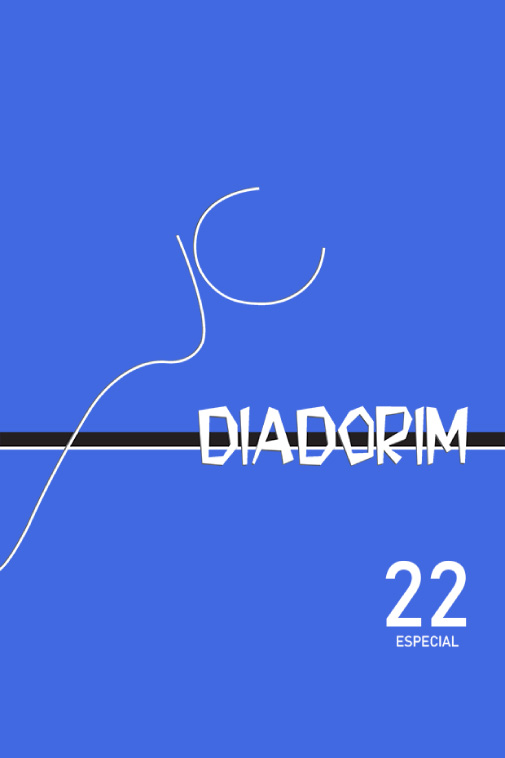Memory and responsiveness in Jesusalém, by Mia Couto
DOI :
https://doi.org/10.35520/diadorim.2020.v22n3a36401Mots-clés :
Dialogism, Responsiveness, Memory.Résumé
The romance Jesusalém, published in 2009 by Mia Couto, brings up the story of five Mozambicans - including Silvestre Vitalício and his two children - who will take refuge in an isolated land. The undertaking takes place out of the patriarch's desire to rebuild his present by abdicating the past. Jesusalém, the name given to the place, is now inhabited by interdictions made by the father to his children, in relation to the construction of this past. In the new home, there will be no space for expressions of memory, always rejected by the patriarch who imposes silences in its place. In view of the above, we propose to carry out in this analysis a dialogical reading about the (suppression of) the memory in the narrative plot, realizing the responsive attitudes generated, especially in the face of the interdiction of the report. We also need to understand how this silencing that encompasses the family microcosm can be extended to that experienced by the Mozambican homeland. Despite the father's effort, the complete forgetting of these memories cannot be fully realized (GAGNEBIN, 2009) and in the face of his fanciful and fallacious speech, the children will constantly perform responsive attitudes (BAKHTIN, 1986) related to both Silvestre's speech, as to the speech of the other two adults to whom they have access, seeking to recover this lost past.
Références
BAKHTIN, M. Speech genres and other late essays (V. W. McGee, Trans.), Austin, TX: University of Texas Press, 1986.
BURKE, P. History as Social Memory. In: Varieties of Cultural History. Ithaca, NY: Cornell University Press, 1997.
COUTO, M. Antes de nascer o mundo. São Paulo: Companhia das Letras, 2009.
FANON, F. Os condenados da terra. Juiz de Fora: Editora UFJF, 2006.
FREUD, S. The Complete Letters of Sigmund Freud to Wilhelm Fliess. Trans. and ed. Jeffrey Moussaieff Masson. Cambrigde: Harvard University Press, 1985.
GAGNEBIN, J. M. Verdade e memória do passado. In: Revista do programa de estudos pós-graduados em História, PUC-SP, n. 17, nov. 98, p. 218.
______. Lembrar escrever esquecer. São Paulo: Ed. 34, 2009.
HALBWACHS, M. Memória coletiva e memória histórica. In: A memória coletiva. São Paulo: Centauro, 2006.
IGREJA, V. Memories as Weapons: The Politics of Peace and Silence in Post-Civil War. In: Mozambique Journal of Southern African Studies, volume 34, n.3, 2008.
MENESES, M. P. Xiconhoca, o inimigo: Narrativas de violência sobre a construção da nação em Moçambique. In: Revista Crítica de Ciências Sociais, n.106, 2015, p. 09-52.
SCHMIDT, S. Onde está o sujeito pós-colonial? In: Abril: Revista de Estudos de Literatura Portuguesa e Africana, Vol. 2, Nº. 2, 2009.
SELIGMANN-SILVA, M. Narrar o trauma: a questão dos testemunhos de catástrofes históricas. In: Psicol. clin. [online]. 2008, vol.20, n.1, pp.65-82.
VOLOSHINOV, V. Marxism and the Philosophy of Language. London, UK: Seminar Press, 1973.
Téléchargements
Publié-e
Numéro
Rubrique
Licence
Transferência de direitos autorais - Autorização para publicação
Caso o artigo submetido seja aprovado para publicação, já fica acordado que o autor autoriza a UFRJ a reproduzi-lo e publicá-lo na Diadorim: Revista de Estudos Linguísticos e Literários, entendendo-se os termos "reprodução" e "publicação" conforme definição respectivamente dos incisos VI e I do artigo 5° da Lei 9610/98. O artigo poderá ser acessado pela internet, a título gratuito, para consulta e reprodução de exemplar do artigo para uso próprio de quem a consulta. Essa autorização de publicação não tem limitação de tempo, ficando a UFRJ responsável pela manutenção da identificação do autor do artigo.

A Revista Diadorim utiliza uma Licença Creative Commons Atribuição-NãoComercial 4.0 Internacional (CC BY-NC 4.0).

